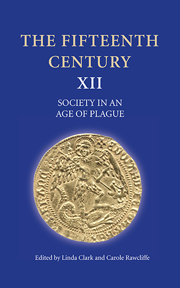Book contents
- Frontmatter
- Contents
- List of Illustrations
- Contributors
- Preface
- Abbreviations
- Introduction
- Looking for Yersinia Pestis: Scientists, Historians and the Black Death
- Pestilence and Poetry: John Lydgate's Danse Macabre
- Pilgrimage in ‘an Age of Plague’: Seeking Canterbury's ‘hooly blisful martir’ in 1420 and 1470
- An Urban Environment: Norwich in the Fifteenth Century
- Mid-Level Officials in Fifteenth-Century Norwich
- Leprosy and Public Health in Late Medieval Rouen
- Plague Ordinances and the Management of Infectious Diseases in Northern French Towns, c.1450–c.1560
- The Renaissance Invention of Quarantine
- Coping with Epidemics in Renaissance Italy: Plague and the Great Pox
- The Historian and the Laboratory: The Black Death Disease
- Index
- CONTENTS OF PREVIOUS VOLUMES
Leprosy and Public Health in Late Medieval Rouen
Published online by Cambridge University Press: 05 September 2013
- Frontmatter
- Contents
- List of Illustrations
- Contributors
- Preface
- Abbreviations
- Introduction
- Looking for Yersinia Pestis: Scientists, Historians and the Black Death
- Pestilence and Poetry: John Lydgate's Danse Macabre
- Pilgrimage in ‘an Age of Plague’: Seeking Canterbury's ‘hooly blisful martir’ in 1420 and 1470
- An Urban Environment: Norwich in the Fifteenth Century
- Mid-Level Officials in Fifteenth-Century Norwich
- Leprosy and Public Health in Late Medieval Rouen
- Plague Ordinances and the Management of Infectious Diseases in Northern French Towns, c.1450–c.1560
- The Renaissance Invention of Quarantine
- Coping with Epidemics in Renaissance Italy: Plague and the Great Pox
- The Historian and the Laboratory: The Black Death Disease
- Index
- CONTENTS OF PREVIOUS VOLUMES
Summary
In Rouen, as in many other major European cities, following the Black Death (1347–50) there was increased anxiety about environmental health, and it was thought necessary to protect the urban population from the spread of disease through corrupt, or miasmatic, air. These preoccupations were linked to growing concerns about cleanliness, stench, ‘infection’ and the elimination of ‘pollution’, as a result of which certain features of civic life appeared particularly dangerous, including vagrant pigs and poultry, open latrines, the slaughter of animals in public places, rotten food, rubbish and contaminated water. Such anxieties were closely linked to the Galenic model of human health and physiology as disseminated in regimina sanitatis, the health manuals that were becoming increasingly popular in the later Middle Ages. In theory at least, these regimina were addressed to the upper echelons of society, as reflected, for example, by their advice regarding the consumption of expensive foodstuffs. While Galen maintained that good health resulted from the internal balance of the four bodily humours, he also devoted considerable attention to the non-naturals, which were external phenomena and psychological states that could either prevent or cause illness. They included the quality of the environment, food and drink, exercise, sleep, the purgation of bodily fluids and emotional wellbeing.
- Type
- Chapter
- Information
- The Fifteenth Century XIISociety in an Age of Plague, pp. 123 - 138Publisher: Boydell & BrewerPrint publication year: 2013



